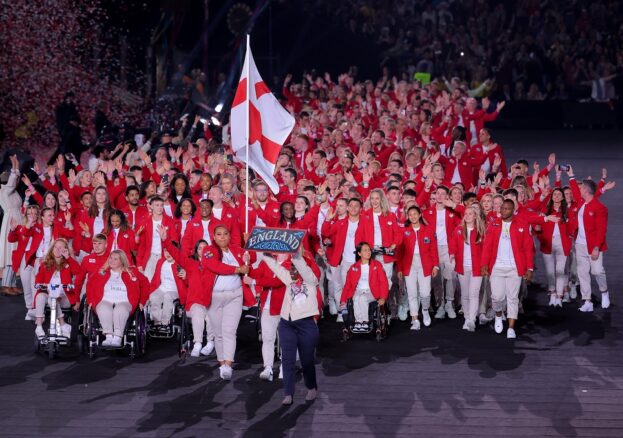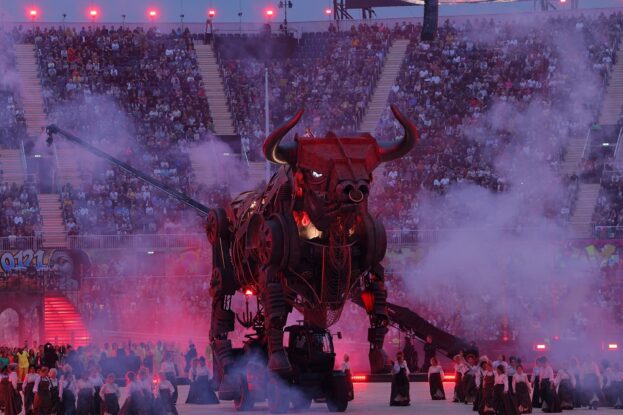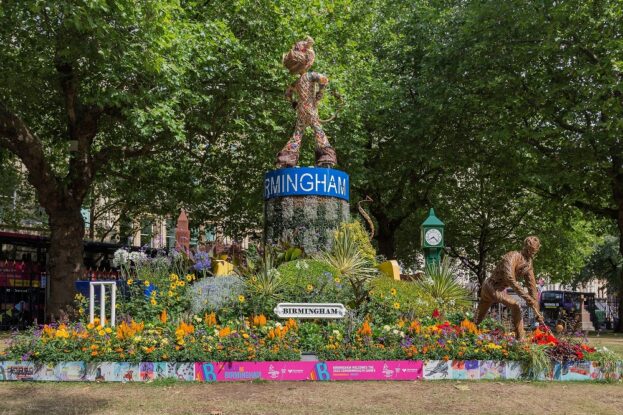
The Commonwealth Games 2022 took place across 15 venues in the West Midlands, with the track cycling at the Lee Valley Velodrome in London. Over 12 days from 28 July to 8 August, Birmingham welcomed 72 teams and around 6,500 athletes and officials; as part of the biggest sporting programme in Commonwealth Games history.
The Commonwealth is home to around two billion people, making up around a third of the global population and a wealth of diverse races, languages, beliefs, cultures, traditions and perspectives. In this review, we take a look back at how the opening ceremony represented Birmingham, and the diversity symbolised by the Games.

The opening ceremony held at Birmingham’s Alexander Stadium on 28 July was a theatrical triumph and a joyous celebration of the history and culture surrounding the UK’s second city. The event was fun, sincere and great family viewing, yet also surreal at times.
The event included dramatisations of key periods in Birmingham’s history, including the city’s links to the slave trade; and the car industry – one of the earliest forms of employment for members of the Windrush Generation. It also focused on the cultural diversity of modern Birmingham – Britain’s most diverse city. African-Caribbean, Irish and South Asian communities were all involved in the opening ceremony, along with (mostly) brilliant ‘Brummie’ talent including comedians, actors, creatives, musicians and dancers.
The team behind the event was brought together by the Commonwealth Games Chief Creative Officer, Martin Green CBE, who masterminded the London Olympic and Paralympic Games ceremonies in 2012.
The team was led by Executive Producer, Steven Knight CBE, the creator and writer of the hugely popular TV show, Peaky Blinders; with other members including Production Designer, Misty Buckley, recently nominated for a BAFTA Award for Stormzy’s performance at Glastonbury Festival; Artistic Director, Iqbal Khan, a globally renowned theatre director; novelist and short story writer, Maeve Clarke whose work incudes ‘Whispers in the Walls’, an anthology of new Black and Asian voices from Birmingham; music director, Joshua ‘RTKal’ Holness, an international rapper and co-creator of a project offering music education and recording facilities to young people and underprivileged groups in the city; and BAFTA Award-winning Broadcast Director, Hamish Hamilton, who has directed and executive produced ceremonies, award shows and concerts worldwide.
Comedian and actor, Sir Lenny Henry, who was born and raised in Dudley by his Jamaican parents, carried the late Queen’s Baton on the eve of the opening ceremony, on the final leg of its journey. He said the experience: “fills me with massive, pride especially when I think of how far it’s travelled over the past nine months. It has crossed land, sea and air to cover every corner of the Commonwealth, including my parents’ home of Jamaica, and all the way to Birmingham City Centre (just down the road from Dudley where I got my first humungous break); and carried all the way by inspirational individuals whose stories have blown me away.”
Sir Lenny Henry also introduced the world to “The Great Nation of Dudley” as he kicked off the Commonwealth Games athletes’ parade in Birmingham, saying to the audience: “You are all fantastic by the way…all your little faces smiling at me; black, brown, pink, white, sunburnt from last week.”

Comedian Joe Lycett used humour to shine a light on the government’s much-criticised approach to immigration, saying: “I’m going to do something now that the British government doesn’t always do, and welcome foreigners and welcome the region of Asia.”
Similar virtual messages of welcome, encouragement and support for the competitors came from other famous faces including Strictly Come Dancing judge, Motsi Mabuse; singer-songwriter Lenny Kravitz; and Sir Mo Farah CBE, the most successful British track athlete in modern Olympic Games history. As the athletes entered the arena, an on-screen Mo Farah told team England to ‘cherish’ the experience. “Go out there, be strong and do the best that you can and enjoy it, because when the home crowd gets behind you it’s a massive boost.”
Sir Mo recently revealed in a BBC documentary that he was trafficked to the UK as a child and forced to work as a domestic servant. The programme has inspired others to reach out, with calls to trafficking charity, Unseen UK, rising by 20%. Sir Mo’s story also shows the difference one individual can make as an ally. Mo’s ally was his school PE teacher, Alan Watkinson, who recognised his athletic talent and contacted social services after Mo confided in him, helping him to be safely fostered by another Somali family.
Other inspirational moments in the opening ceremony included a speech by Nobel Peace Prize-laureate and activist, Malala Yousafzai, about the importance of education for girls. Pakistan-born Malala and her family have made Birmingham their home, after she was shot by Taliban terrorists in Pakistan for campaigning for girls’ education.
A 10-metre tall, mechanical ‘Raging Bull’, symbolising Birmingham’s iconic Bull Ring Shopping Centre, industrial past and links to the slave trade, was a leading feature of the event. It is now attracting crowds on display in Birmingham’s city centre. The official mascot of the games is also a bull; ‘Perry the Bull’ designed by 10 year old Emma from Greater Manchester, as part of a national competition.
The Bull Ring Centre’s outdoor market became a go-to place for the Windrush Generation in Birmingham and around the East Midlands in the early 1960s, as at last people could buy foods they would have enjoyed back in the Caribbean, including dried beans and saltfish.
Not far from the Bull Ring Centre is Jamaica Row – which has featured on street plans of the city since the 18th century. The street was part of Birmingham’s market area and the name is thought to show the city’s links to the slave trade. Fruits such as bananas were imported from plantations in the Caribbean, with crops planted and harvested by the enslaved. As well as shops and houses, Jamaica Row was home to a pub called The Black Boy, named after King Charles II, who was dark-skinned and called ‘my Black boy’ by his mother. A sheltered vegetable market opened in Jamaica Row in 1884, and today the historic street known as ‘old Jamaica Row’ is still home to Birmingham’s Open Market, with 130 stalls selling fruit, vegetables and more.
As the Commonwealth Games opening ceremony showed, Birmingham is a unique city full of great stories and vibrant history, made richer by the diversity of its inhabitants.
